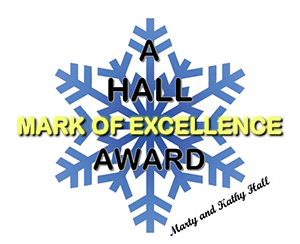 This World Cup coverage is made possible through the generous support of Marty and Kathy Hall and A Hall Mark of Excellence Award. To learn more about A Hall Mark of Excellence Award, or to learn how you can support FasterSkier’s coverage, please contact info@fasterskier.com.
This World Cup coverage is made possible through the generous support of Marty and Kathy Hall and A Hall Mark of Excellence Award. To learn more about A Hall Mark of Excellence Award, or to learn how you can support FasterSkier’s coverage, please contact info@fasterskier.com.
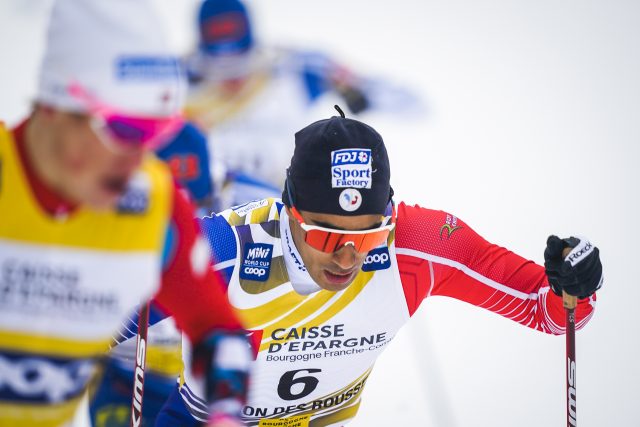
“Incroyable!” . . . Most Americans know, understand, or recognize at least a little bit of French. All those partly-understood French phrases and terms were on display today on the World Cup Sprint course in Les Rousses, France. Élan, panache, incroyable . . . accompanied by the sweet strains of la Marseillaise (the French national anthem) sung by a partisan crowd: these were the elements of of the long-awaited victory of Richard Jouve (FRA) over the sprint king, Johannes Hoesflot Klaebo (NOR).
North Americans had heroes to cheer as well, but those heroes had other forces to contend with. Antoine Cyr (the sole Canadian entry) qualified 21st, but tangles in his quarterfinal would see him finish the day in 22nd. Ben Ogden (USA) continued his pursuit of a World Cup sprint final, but saw his aspirations veer wildly off course in the semifinal. Having qualified seventh, he would finish the day in 11th (though with stories to tell). Other American finishers included Kevin Bolger 39th, Zak Ketterson 42nd, Will Koch 53rd.
Men’s Classic Sprint
Les Rousses, France is the World Cup site that has been forced to wait. An assigned stop on the FIS calendar through the last two years, Les Rousses has fallen victim to event cancellations during the Covid pandemic. The French crowd has waited a long time to cheer their skiing heroes in their homeland. Finally, the opportunity to do so had arrived . . . and the French athletes (both men and women) rose to the occasion. After Delphine Claudel’s (FRA) podium performance in Friday’s Women’s 10 k Skate, the eyes of France turned to the sprinters, and especially to Richard Jouve who claimed the World Cup Sprint title—in Klaebo’s absence—in 2022. Home turf, home crowd: time for Jouve to show what he can do.
The sprint course at Les Rousses is new to World Cup racers, so tactics would emerge as the heats played out. A quick uphill challenges the racers just as they exit the stadium; the women’s racers were forced into a full herringbone stride just twenty seconds into the race, though most of the men’s field could half-stride. Thereafter, the course rises and falls, but with no significant on which Klaebo would typically unleash his high-tempo striding. This classic sprint would be a test of tactics as well as speed.
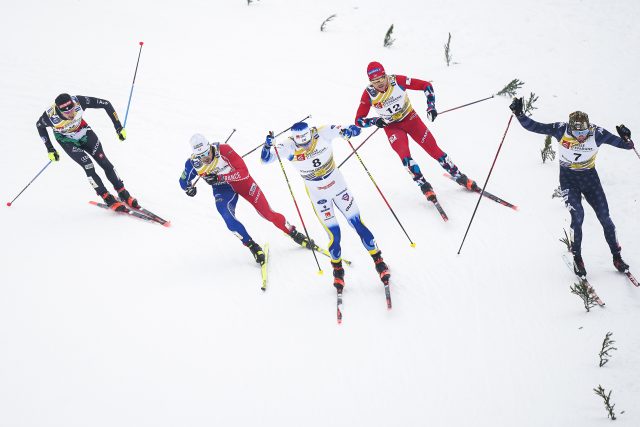
Semifinals
While Klaebo and Jouve showed tactical brilliance in advancing through the first semifinal, it was the second semifinal that would provide the drama (for American ski fans, at least). The second semifinal was quite a bit more loaded than the first: Ogden would need to deal with perennial contenders Golberg, Haavard Solaas Taugboel (NOR), Federico Pellegrino (ITA), and Lucas Chanavat (FRA). The top sprinters are consistently the top sprinters: obviously, there’s something different about the way they do things, about the speed they possess, about their tactical acumen. Even so, each sprint final always seems to involve a couple of other racers who somehow managed to get in there. Ogden is hoping to become one of the top sprinters, but first he needs to find that little bit of luck that allows him to be one of the “other racers” who work their way into a final.
Ogden is a native of tiny, idyllic, Landgrove Vermont just down the road from the Wild Wings Ski Touring Center where owners—Chuck, Tracy, and Ian Black—have always patiently allowed the building of jumps in the parking lot. On those jumps, kids growing up in West River Nordic ski club—including Katharine Ogden, Will Koch, Sophie Caldwell, and Ben Ogden—have developed into some of the most notable skiers in modern American skiing. They all grew up hitting those jumps, awaiting the day when those skills of deft and daring would come into play. For Ben Ogden, today was that day. He had won his quarterfinal ahead of Haavard Solaas Taugboel (NOR), but Ogden’s semifinal would prove to be the harder test.
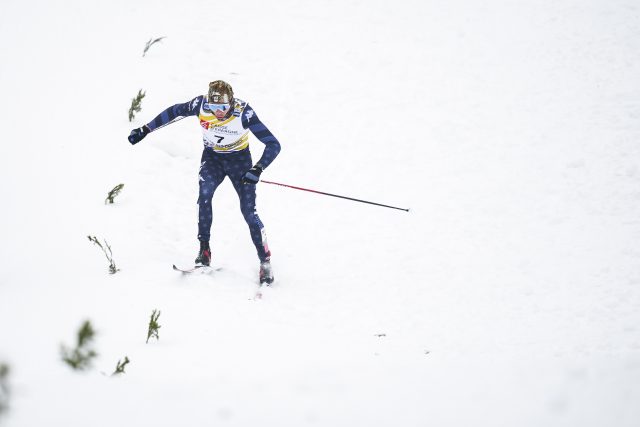
Ogden shot to the lead in his semifinal, looking as though he might be attempting the same tactic that got so much attention earlier in the season when he forced the pace from the gun in a Sprint at the Tour de Ski (causing trouble for—and inspiring humorous quotes from—Klaebo and Sweden’s Calle Halfvarsson); but, so soon after recent transatlantic travel and a stack of collegiate races, Ogden seemed to tire a bit mid-race. Ogden still led as the field powered through a downhill right-hand curve, where Marcus Grate (SWE) moved inside of Ogden’s line just before the apex. It appeared that Ogden drifted wide to avoid tangling with Grate when the soft snow began to give way beneath his feet. At top speed, Ogden’s momentum carried him through the course-lining pine bows and well down an off-camber slope of deep, soft snow. That he managed to stay on his feet was a miracle of sorts. That he managed to veer back onto the race course was a testament to those hours parking-lot-jumping back at Wild Wings. But the damage had been done, and Ogden would only make up one spot before the finish line which he crossed in fifth (11th on the day).
As Ogden was exiting the course, Golberg was weaving his way invisibly through the pack. Golberg sneaked through to take the semifinal win ahead of Pellegrino who skipped nimbly through the final turn to steal the inside line from Chanavat and double-poled speedily across the line for the second automatic entry into the final.
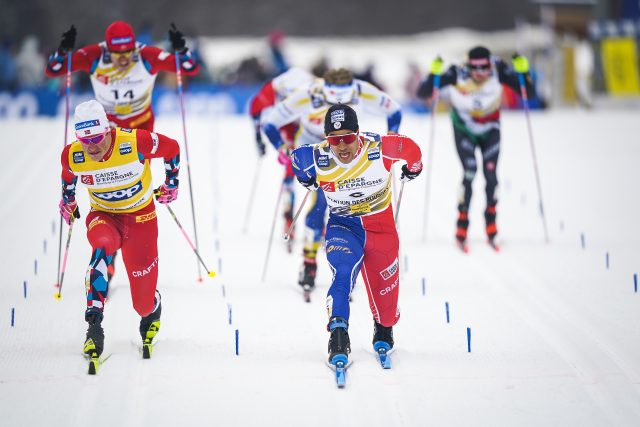
Men’s Sprint Final
Pellegrino is always fast, always dangerous, always tactically adept. Jouve is always fast, always a problem, always able to take up space. Golberg remains something of an unknown in sprint finals (though he typically qualifies for those finals, and generally does well at the finish). In Les Rousses, Golberg had remained virtually invisible throughout the quarterfinal and semifinal rounds, only appearing at the finish line to take wins in his quarterfinal and semifinal heats. Klaebo had little to gain, little to lose: with the FIS points structure creating only minimal gaps between finishers, the race for the overall standings was unlikely to be greatly affected by the results of the sprint final.
From the gun, Edvin Anger (SWE) sprinted to the lead followed by Jouve and Klaebo. Pellegrino—as he so often does—stepped in behind Klaebo. Predictably, Golberg stayed in the back, though his presence was not forgotten as Klaebo bothered to check his rearview mirror (purportedly for Golberg) before gliding forward to challenge Jouve at the curve leading into the final downhill. If Klaebo had overtaken Jouve at the curve, the final result may have been different. As it was, Jouve held the inside line on the turn, and his skis proved fast enough to maintain the lead. Klaebo was forced to undertake numerous lane changes approaching the finish as Jouve dominated the center track. In the end, Jouve’s double pole proved too strong for Klaebo to overtake, and Jouve earned a glorious victory on the course in his home country, and in front of wildly cheering French fans.
Invisible as ever, Golberg sneaked through to pip Grate at the line for third.
The day belonged to Richard Jouve who claimed his fourth career World Cup victory. Finally, he had met Klaebo face to face, and had vanquished him. And in front of a cheering partisan crowd, no less. It was an understandably emotional win for Jouve who pointedly conducted his post-race stadium-interview in his native French so that the gathered fans would understand his loyalty, and witness his pride. The crowd sang la Marseillaise, as Jouve shed tears of joy. “Incroyable . . .”
Men’s Classic Sprint RESULTS
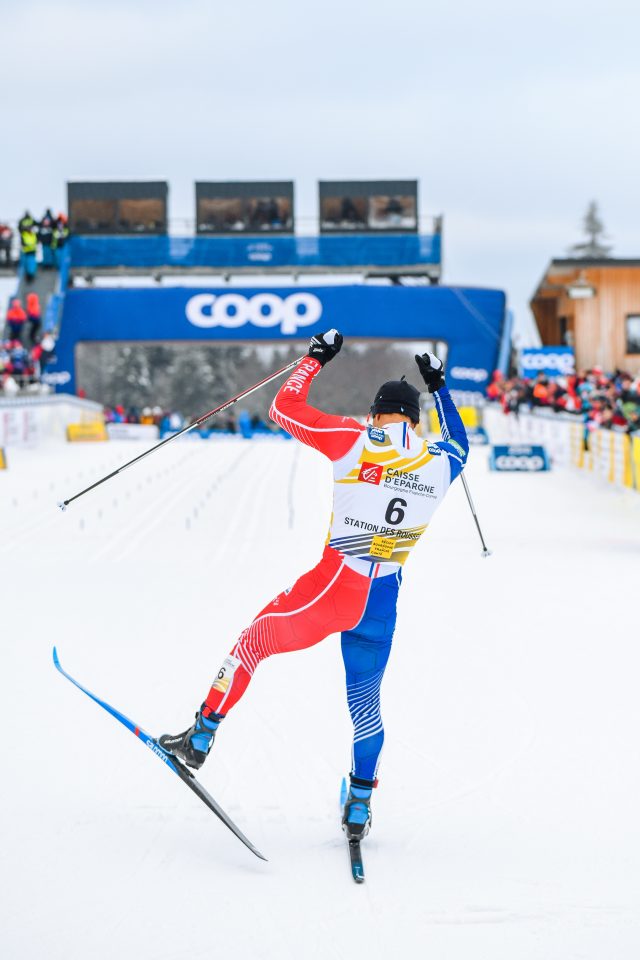
John Teaford
John Teaford—the Managing Editor of FasterSkier — has been the coach of Olympians, World Champions, and World Record Holders in six sports: Nordic skiing, speedskating, road cycling, track cycling, mountain biking, triathlon. In his long career as a writer/filmmaker, he spent many seasons as Director of Warren Miller’s annual feature film, and Producer of adventure documentary films for Discovery, ESPN, Disney, National Geographic, and NBC Sports.



